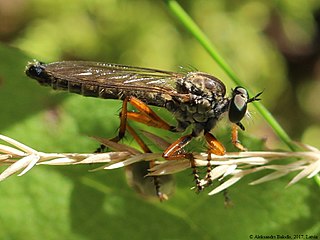
Abantiades is a genus of moths of the family Hepialidae. There are 37 described species, all found exclusively in Australia. The group includes some large species with a wingspan of up to 160 mm. The larvae feed on the roots of Eucalyptus and other trees. Simonsen's 2018 revision of the Australian Hepialidae synonymized the genera Bordaia and Trictena to Abantiades, and included the former genera's species here.

The greater lophorina, formerly a subspecies of the superb bird-of-paradise, is a species of passerine bird in the bird-of-paradise family Paradisaeidae. It is found in the central and northeast montane regions of New Guinea.

Brookvalia is an extinct genus of prehistoric freshwater ray-finned fish that lived during the Middle Triassic epoch.
Hierodula latipennis is a species of praying mantis in the family Mantidae.

Abantiades latipennis, known as the Pindi moth, is a species of moth in the family Hepialidae. It may also be referred to as a swift moth or a ghost moth, as this is a common name associated with Hepialidae. Endemic to Australia and identified in 1932, it is most populous in temperate rainforest where eucalypti are prevalent, as the larvae feed primarily on the roots of these trees. Females lay eggs during flight in a scattering fashion. The larvae live for over eighteen months underground, while adult moths survive for approximately one week, as they have no mouthparts with which to feed. The moths are preyed upon by a number of predators, including bats and owls. Brown in colour overall, males are paler and the identifying silver bars of the male's wings are more prominent than those of the female's, with dark margins. Male adults are generally smaller.
Caenis latipennis is a species of small squaregilled mayfly in the family Caenidae. It is found in Central America and North America. In North America its range includes all of Canada, all of Mexico, and the continental United States.

Lomamyia is a genus of beaded lacewings in the family Berothidae. There are about 11 described species in Lomamyia.
Tetraphleps latipennis is a species of minute pirate bug in the family Anthocoridae. It is found in North America.

Neomochtherus pallipes, the Devon red-legged robber fly, is a species of robber fly in the family Asilidae.
Neomochtherus comosus is a species of robber flies in the family Asilidae.
Geodercodes latipennis is a species of broad-nosed weevil in the beetle family Curculionidae. It is found in North America.
Neomochtherus auricomus is a species of robber flies in the family Asilidae.
Ospriocerus latipennis is a species of robber flies.

Panorpa latipennis is a species of common scorpionfly in the family Panorpidae. It is found in North America.
Trypherus latipennis is a species of soldier beetle in the family Cantharidae. It is found in North America.

Archophileurus is a genus of rhinoceros beetles in the family Scarabaeidae. There are at least 30 described species in Archophileurus.
Neomochtherus californicus is a species of robber flies in the family Asilidae.

Elicinae is a subfamily of tropiduchid planthoppers in the family Tropiduchidae, with Elica the type genus.

Neomochtherus geniculatus is a species of fly in the robber fly family, Asilidae.











